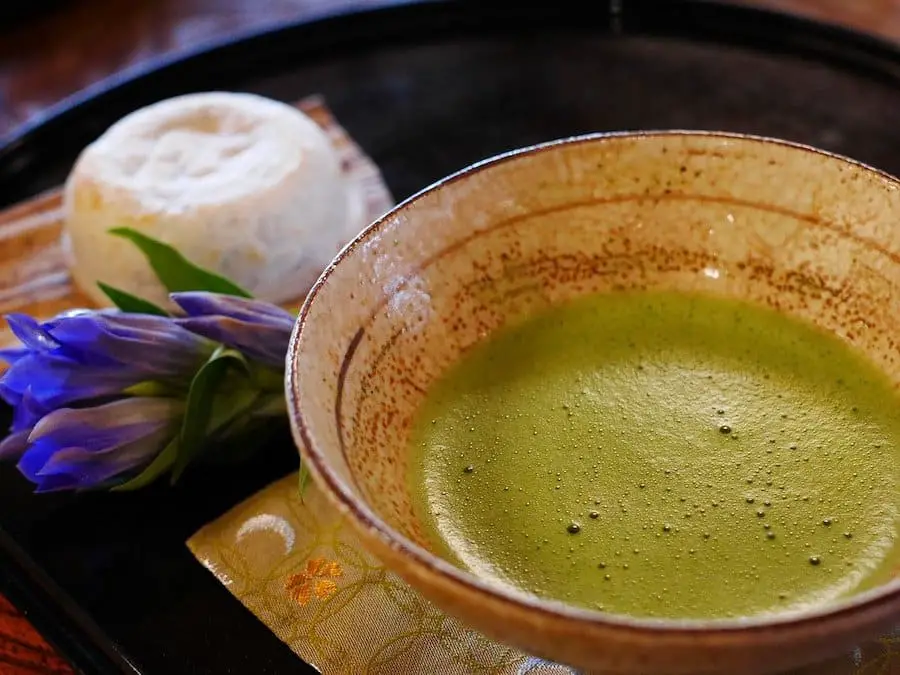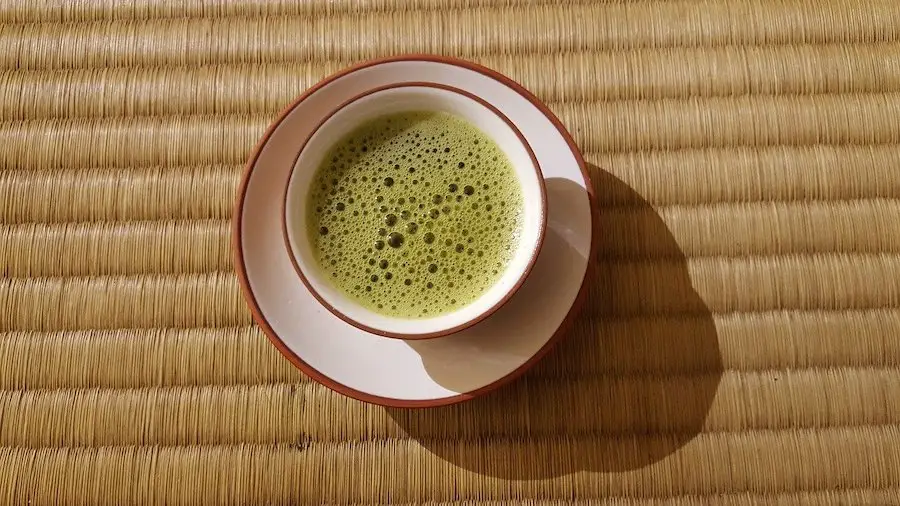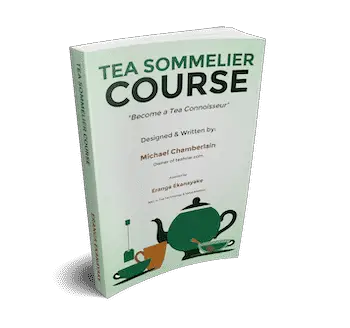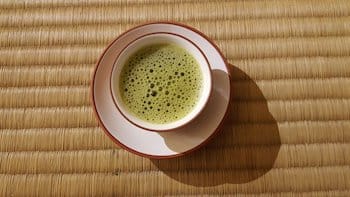Matcha is a distinct type of green tea. It’s in powder form, it;’s very popular, and has numerous benefits, which makes it very popular but does matcha tea have caffeine? That’s what I’m going to answer in this article, Starting with a quick summary…2
One cup (8 oz / 237 ml) of Matcha tea averages 70mg of caffeine, lower than caffeine in coffee and greater than in green tea. Matcha tea is made from the true tea plant “Camellia Sinensis”. Specifically, it’s made from powdered green tea. So like any true tea, Matcha tea also contains caffeine.
Does Matcha Tea Have Caffeine
So let’s drill down further on how much caffeine is actually in Matcha and why, as well as other details and factors that impact Matcha caffeine content…
How much caffeine does Matcha tea have?
As I mentioned above, an average cup of Matcha tea will contain around 70mg of caffeine.
This varies depending on how much matcha powder one cup has, the higher the amount the higher the caffeine. Also, it varies depending on factors such as harvesting, brewing, and any other ingredients you add to your Matcha drink.
The caffeine content in Matcha tea is derived from the tea plant “Camellia Sinensis”, like any other of the 4 main types of tea.
Herbal teas, on the other hand, are only an infusion of plant materials with no added caffeine. I have discussed caffeine content in some herbals teas and some true teas, here are a few examples you might want to check out…
The caffeine content in Earl Grey
Does Chamomile tea have caffeine.
Some tea brands add black, green, or white tea to some herbal teas in order to add a kick of caffeine. Check out my article White tea vs matcha.
There are no such additions with Matcha tea – there doesn’t need to be. Matcha tea is made directly from green tea, produced by grinding green tea into a fine powder.
And when I say “directly” from green tea, the main difference is you actually consume the ground leaves of the tea plant. This has a far greater beneficial impact than just steeping the leaves of green tea.

Matcha tea has less caffeine than coffee
The general answer to this question is yes definitely. Matcha tea has a lower caffeine content than coffee.
A cup of Matcha tea has 70 mg of caffeine, whereas a cup of coffee has anywhere from 108-200 mg. But this again can vary based on a number of variables – not just for Matcha tea – but coffee too.
The caffeine in a cup of coffee can vary based on the types of beans and how they’re roasted, brewed, what’s added to the brew, and so on.
For example, a typical shot of espresso has around 65mg of caffeine. So there’s no precise answer to this question …and without scientific measuring equipment, we can only generalize based on previous studies.
So generally, there’s a lower level of caffeine in matcha tea as opposed to coffee.
As a guide, you would need approximately 2 cups of Matcha tea for every one cup of coffee in order to even out the caffeine amounts.
Why Matcha has more caffeine than green tea
Matcha has more caffeine than green tea simply because it’s concentrated in the form of a powder.
Standard green tea is ground into fine particles to form a powder called “Matcha”. This powdered consistency naturally means a cup of Matcha will have more caffeine than a regular cup of green tea. Here’s more info on the caffeine content in green tea.
This concentrated form of green tea is what gives Matcha its thick and creamy texture.
More green tea is required to make one cup of Matcha, so this naturally means it has more caffeine than green tea.
Aside from the caffeine, this also means that the benefits of green tea are higher in a cup of Matcha.
Looking at the comparison, a cup (8 oz, or 237 ml) of Matcha is equal to about 3 cups (711ml) of regular green tea.
And as a guide, here’s how many cups you should drink per day of each type of tea.
For caffeine, one regular cup of green provides 25-35 mg of caffeine whereas a cup of Matcha provides 70-100mg.
This does depend on how much Matcha powder you add.
However, a standard cup of Matcha calls for 3-4 teaspoons of Matcha powder. When using this measurement, then one cup of Matcha could hold 280mg of caffeine.
This high caffeine content deters many from drinking one full (237 ml) cup of Matcha tea at once.
It’s common to see many matcha tea drinkers have 2-4 oz. (59-118ml) rather than one cup 8 oz.
To get the benefits of one cup of Matcha, you would need to drink three cups of green tea.
Does Matcha tea have too much caffeine?
There is growing concern regarding Matcha tea being the perfect and healthy substitute for coffee.
And with Matcha tea matching a caffeine profile not far behind that of coffee, this concern is well-founded.
So many tend to ask if Matcha tea has too much caffeine – sufficient to match the overly-caffeinated effects of coffee.
Matcha powder could replace coffee
In truth, Matcha tea has caffeine in sufficient enough quantities that it could match the caffeine effects from coffee.
Meaning just like coffee, Matcha tea acts as an energy booster and as a beverage that can kick start your day and keep you alert. That’s why it features in my list of 20 best teas to drink in the morning. That’s worth checking out!
However, Matcha tea doesn’t deliver the unwanted and often uncomfortable jittery effects we get with too much coffee.
As well as this, it’s packed with a wealth of other benefits anyway, such as a host of antioxidants for cancer prevention, weight management, and lowering cholesterol.
In short, it has a lot more antioxidants than you get from a regular cup of green tea. Again, this is because you’re actually consuming the plant, rather than just drinking its steeped produce.
So while Matcha can potentially deliver too much caffeine …which perhaps gets a little too close to that of coffee, it doesn’t give the same overwhelming effects that coffee does.
Without the highs and the crashes, this makes Matcha tea a cup of stellar alternative to a morning cup of coffee.
In fact, I think I want some now! The trouble is Matcha can be expensive – especially if you drink it regularly. And who wants to make an expensive purchase if you’re trying it out, or in the event that your Matcha might go bad before it’s used!
So if you’re not yet a Matcha aficionado, then I’d recommend getting the Culinary-grade of Matcha from Amazon as a starting point. You may not actually notice any difference!
However, if you are a “professional” Matcha drinker and tea caffeine craver, then you should probably opt for the Ceremonial-grade Matcha, also on Amazon.

Exceptions: When Matcha tea may have less caffeine
In recent times there are plenty of variations to Matcha tea.
Starting with different flavored Matcha tea, and Amazon has you covered on these too (of course!). Flavors such as chocolate Matcha tea and mint Matcha tea. In such cases, depending on other ingredients added, the caffeine content in your Matcha tea can be less.
Aside from this, Matcha tea latte such as strawberry Matcha latte or smoothies such as Matcha orange or mango smoothies can also have less caffeine than regular Matcha.
This reduced caffeine content in Matcha tea blends can come from two factors.
The first is based on what other additions are made to a regular Matcha powder. The extra ingredients are added to Matcha powder, the lesser the caffeine.
Secondly, how you have your Matcha tea. It could be like a latte with other ingredients added or so on.
When you add other ingredients to make an unauthentic Matcha brew, it will likely reduce the Matcha powder added. This will thereby reduce the caffeine content.
Factors that change the caffeine content in Matcha Tea
Many factors can decide how much caffeine Matcha tea holds. Firstly place of cultivation, growing method, harvesting time, and processing makes a difference.
These also add up to the quality of your matcha tea.
For example, mature leaves and roasting can reduce the caffeine content in your matcha tea powder. And how much Matcha tea powder you add per cup. Obviously, the more tea powder you add the higher the caffeine, ergo the thicker your Matcha tea is the higher the caffeine too.
If you’re looking to reduce the caffeine content in matcha tea, you can also consider decaf Matcha. This is primarily marketed for those who are overly conscious about the high caffeine in Matcha tea.
More tea info!
I hope this has thoroughly answered the question “does Matcha tea have caffeine”.
If you’re starting out with tea, or are looking to “take your tea a huge steep forward”! Then you’ll love my Tea Sommelier course, check it out below…

Take the fast track and become a tea connoisseur
Whether for enjoyment or considering a career as a tea sommelier. This course has everything you need to enhance your tea knowledge and tea-tasting skills.
This course keeps it simple with step-by-step tea tasting and easy reference guides
For pleasure, or as a precursor to a career in the tea industry. Find out what tea sommelier actually does, their career paths, and what they earn.

Find out more about the Teahow Tea Sommelier Course!
Find out more about the Teahow Tea Sommelier Course!

